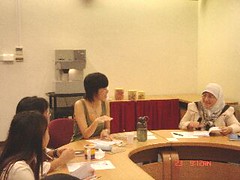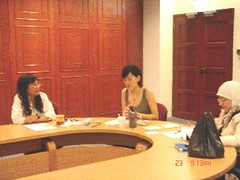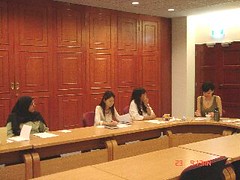Reported by Marhama Mohammed, Adult & Young People's Services Librarian
Colin Cheong, author of
Tangerine, was at
CCKCL to discuss his book as part of the
READ! Singapore event at the library on 11 June 2005. He went to Vietnam in 1993, wrote the book in 1996 and was subsequently published in1997. If you had missed the session at CCKCL, here are the highlights of the discussion:
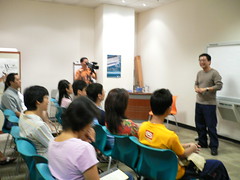 1. Choice of title- Tangerine (fruit - an orange)
1. Choice of title- Tangerine (fruit - an orange) Local girls selling tangerines are a common sight in Vietnam. The fruit was also distributed during in-flight services of the Vietnamese airlines. In the words of the author "one of the few airlines in those days giving out oranges ~ a rare sight indeed!"
On being asked about the use of alliterations in his novel; Issues of colonialism, communism, capitalism and consumerism, it was to give a perspective of Vietnam undergoing change during different periods in history, from being a French colony to independence to communism.
It was also interesting how others thought of things that were taken for granted at home such as the SDU and COE. His travelling pals from Canada thought it was quite strange to have the government intervene in social engineering (procreation of citizens ie the graduates).
2. On women and education in Vietnam:One would have not thought of Vietnamese women going to war in this male dominated society, fighting against the Viet Congs and being apt at handling rifles. Vietnam’s literacy rate was at 99.9 %.
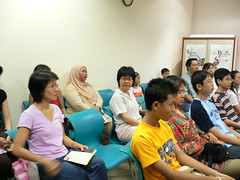 To conclude:
To conclude:The author ended the story with him buying the tangerines and later, much to the girl’s surprise, peeling, and sharing half of the orange with her. In the author’s words “ in that moment, it was all that mattered.” He could not have thought of a better way to end the story.
After what he had seen of Vietnam, he was asked if he had ever thought of being fortunate to be a Singaporean. Pausing for a moment, he replied that never once did he compare himself to them except that, he thought, if he were to be in their position, he was wondering if he could cope.”
The session was an “eye-opener” on Vietnam for many of us who attended. More than 10 years had passed since he last visited Vietnam, the passion he had for the country was still evident through his personal recollections. The author also shared with us the original photo prints that he took of Vietnam - one of which was used as the bookcover.






